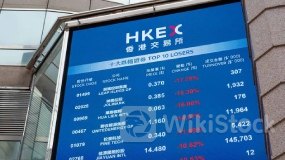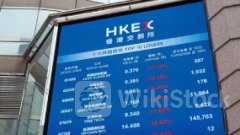
Byte refutes rumors of speculation on A-share Doubao concept stocks
According to Fast Technology on December 20, the A-share market has recently seen a wave of speculation on Doubao concept stocks, with related concept stocks such as Visual China and 3D Communications being hyped. Among them, Visual China's cumulative increase in the past 13 trading days has reached 103.76%. On the evening of December 19, ByteDance refuted rumors that the capital market was hyped about "Doubao concept stocks," which involved exaggerated and even fictitious content in ByteDance's capital expenditures, data center costs, AI hardware, application cooperation, and other aspects.

How to develop a low-altitude economy
The low-altitude economy is a comprehensive economic form with low-altitude flight activities at its core. It is a new type of productivity composed of technologies such as unmanned flight and a low-altitude intelligent network that interacts with factors such as airspace and market, driving the development of low-altitude infrastructure, low-altitude aircraft manufacturing, low-altitude operation services, and low-altitude flight support. From aircraft manufacturing to infrastructure construction, the entire low-altitude economy industry chain has shown rapid development momentum. According to the Civil Aviation Administration of China, by 2025, the market size of my country's low-altitude economy will reach 1.5 trillion yuan, and by 2035 it is expected to reach 3.5 trillion yuan.

Doubao concept surges, IPO economy booms
Artificial intelligence (AI) is hot again in A-shares. This time, Doubao concept stocks have become one of the most popular concept stocks after Kimi concept stocks and Zhipu concept stocks. “No Doubao, no AI.” As the Doubao concept continues to ferment in A-shares, some investors shouted this slogan. In addition, this morning, the market also paid more attention to the concept of the IPO economy, and sectors such as exhibitions and the IP economy rose. Disu Fashion jumped high and hit the daily limit shortly after the opening. This Central Economic Work Conference made it clear that next year, the focus will be on expanding the implementation of the “two new” policies, innovating diversified consumption scenarios, expanding service consumption, and promoting the development of the cultural tourism industry. Actively develop the IPO economy, ice and snow economy, and silver economy.

5G enters the "second half", which stocks are the best to buy
Zhitong Finance APP learned that on December 12, Zhang Yunming, member of the Party Leadership Group and Vice Minister of the Ministry of Industry and Information Technology, stated at the 2024 China 5G Development Conference that as of the end of October 2024, the total number of 5G base stations in my country will reach 4.141 million, with 29 5G base stations per 10,000 people, completing the “14th Five-Year Plan” development goals ahead of schedule. Zhang Yunming revealed that a report from the Global System for Mobile Communications Association showed that China's mobile ecosystem represented by 5G will create about 8 million jobs in 2023. According to estimates by the China Academy of Information and Communications Technology, 5G commercial use has directly driven a total economic output of about 5.6 trillion yuan and indirectly driven about 14 trillion yuan in the past five years.

The cumulative increase in gold prices is nearly 30%. What should investors do?
Gold price fluctuations have become a hot topic this year. Overall, gold prices have risen significantly by nearly 30%. Although gold prices continue to rise and even hit a record high, the performance of companies in the gold industry chain is differentiated. While the performance of companies upstream of the gold industry chain has increased, the performance of many gold shops has declined and they have reduced their store numbers. Analysts pointed out that although gold is regarded as a safe-haven asset, the risk of volatility still exists and investors need to make decisions carefully.

CSI A500 ETF receives over 220 billion yuan in inflows, brokerage asset management layout
This year, the CSI A500 ETF (Exchange Traded Fund) has been launched with a scale of over 220 billion yuan. As of December 4, the scale of passive index funds linked to the CSI A500 has exceeded 200 billion yuan, setting a new record. If the 2.974 billion yuan of enhanced index funds is included, the cumulative scale will reach 224.351 billion yuan. Recently, following the hot issuance of CSI A500 ETF, index enhancement funds linked to the index have also been launched one after another, and securities asset management companies have also joined the index enhancement track.

Semiconductor stocks recover to record highs
On November 28, Cambrian-U, the second-highest stock in the A-share market, continued to hit a record high, rising by more than 10% during the session, reaching a peak price of 588.7 yuan per share, and closing up 2.15% at 546.03 yuan per share. Since the beginning of this year, Cambrian-U's stock price has fluctuated upward, with a cumulative increase of 304.59% this year, ranking first in the semiconductor industry. In addition to Cambrian-U, the share prices of the four semiconductor stocks with the highest market capitalization in A-shares all set new historical records in November, including SMIC (90.100, 3.02, 3.47%), Haiguang Information (125.810, -0.19, -0.15%), and North Huachuang (415.680, 2.71, 0.66%), with market capitalizations of more than 200 billion yuan. The Securities Times stated that several semiconductor-related thematic and industry ETFs also received significant net inflows of funds. The Harvest SSE Star Chip ETF has received a net inflow of 16.279 billio

A-shares exploded. What happened?
On the last trading day of November, A-shares suddenly rose strongly and became a hot topic on Weibo! Against the backdrop of weakening Asia-Pacific stock markets, the A-share market has seen a major counterattack. As of midday close, the Shanghai Composite Index rose 1.59%, the ChiNext Index rose 3.83%, the Shenzhen Component Index rose 2.41%, and more than 4,500 stocks rose in the three cities of Shanghai, Shenzhen, and Beijing. At the same time, Hong Kong stocks also improved. The Hang Seng Technology Index rose more than 2%. MSCI China A50 Connectivity Index Futures and FTSE China A50 Index Futures rose more than 2%.

Nuclear fusion industry attracts attention
On November 21, the stocks of many listed companies such as Guoguang Electric, Antai Technology, and Yongding Co., Ltd. experienced gratifying gains, and the A-share market ushered in a wave of “nuclear fusion”. Recently, the State-owned Assets Supervision and Administration Commission of the State Council proposed in a signed article to advance and cultivate future industries such as quantum technology, nuclear fusion, biomanufacturing, and 6G, which once again ignited the market's enthusiasm for the nuclear fusion industry. In the A-share market, many listed companies have entered the nuclear fusion track from different areas of the industrial chain.

Paper companies raise prices, market is improving
Since October this year, many paper-making companies have carried out one or more rounds of price increases. Many of the company's bases have announced price increases. Paper companies from all over the country have followed suit, setting off a new round of price increases in the entire paper-making industry. In the first half of this year, the performance of many paper companies declined in the third quarter, and capacity expansion put greater pressure on the industry. “The main reasons for large-scale price increases in the papermaking industry are, on the one hand, cost requirements, and on the other hand, market demand is gradually recovering.” Chenming Paper said that at present, the papermaking industry has bottomed out and rebounded. Recently, driven by factors such as improvement in supply and demand, many paper companies have issued price increase notices. Recent research reports from a number of brokerage firms stated that the room for further decline in pulp may be l

Will AI glasses be the next trend?
The AI glasses market will become the next super hardware market after smartphones. As a new blue ocean in the smart wearable market, AI glasses have attracted the attention and layout of more and more domestic and foreign companies with their unique interaction methods, diverse application scenarios, and broad market prospects. Keen investors are looking for “AI” and “chain” through channels such as the Interactive Platform.

A-share market continues to fall below record levels
On November 15, the market went down unilaterally in the afternoon, with the ChiNext Index falling by more than 3% for two consecutive days. As of the close, the Shanghai Stock Exchange Index fell 1.45%, the Shenzhen Component Index fell 2.62%, and the ChiNext Index fell 3.91%. Many heavyweight stocks fell sharply, Flush fell nearly 15%, Oriental Fortune fell more than 6%, and more than 4,300 stocks in the market fell. The Shanghai and Shenzhen stock exchanges' trading volume for the whole day was 1.83 trillion, a decrease of 12 billion from the previous trading day. Analysts believe that the current market is slowly transitioning from a liquidity turning point to a fundamental turning point. External factors affect the short-term equity market, but from a medium-term perspective, they are optimistic about the upward trend of the market center.

Hang Seng Index Drops for Second Day, Closes 301 Points Lower
Despite fiscal stimulus policies from Mainland China, the Hang Seng Index (HSI) saw no significant boost, falling for the second consecutive day and closing 301 points down amid reduced trading volume.

Now is a good time to allocate Chinese assets
On October 7, at the Shanghai Stock Exchange International Investors Conference, foreign institutions such as sovereign wealth funds, pension funds, commercial banks, asset management companies, and hedge funds from more than 20 overseas markets including the United States, Europe, Asia-Pacific, the Middle East, and South America expressed their opinions. , Chinas asset management industry contains huge development opportunities. Shen Liang, general manager of Allianz Funds, also said that it is a good time to allocate Chinese assets.

A-shares all rise. How will the three major events go in the super week?
The super week is gradually coming to an end, and three major events are about to be announced, and A-shares are once again booming. On November 7, the three major stock indexes opened lower and moved higher. In the afternoon, they collectively soared by more than 2% due to the outbreak of the financial and consumer sectors. Among them, the Shanghai Composite Index rose by 2.57%, the Shenzhen Composite Index rose by 2.44%, and the Growth Enterprise Market Index rose by more than 3%, reaching 3.75%. A chief strategist of a brokerage analyzed to The Paper reporter that the positive trend of the market on Thursday was due to three factors. First, after overseas-related events came to light, the main line of the market was switched on the market, the market's money-making effect was highlighted, and the bullish atmosphere was strong. The second is the market‘s positive expectations for the incremental policies of the National People’s Congress Standing Committee. The third is the p

The "Four Arrows" of Policy Stabilize the Economy
The Political Bureau meeting of the CPC Central Committee, held on September 26, proposed "increasing efforts to launch incremental policies." Finance Minister Lan Fo'an announced four items at the State Council Information Office press conference focusing on the capital market, local government debt, private economy, and property market. Fiscal incremental policy tools have greatly boosted market sentiment and enhanced people's confidence.

A-shares have experienced sudden changes, and real estate has been among the top gainers
On October 31, the three major A-share stock indexes opened with mixed gains and losses. After a brief retracement in early trading, it strengthened slightly. The GEM index once rose by more than 2% during the session, and the gains narrowed slightly before noon. It maintained a high and volatile trend in the afternoon, and individual stocks showed a general upward trend. On the market, real estate was among the top gainers.

Huawei's industrial chain is collectively strengthening
On Wednesday, the three major A-share indexes continued their adjustment trend, with the CSI 500, CSI 1000, and other indices bucking the trend and strengthening. The Shanghai Composite Index opened lower in early trading and bottomed out in the afternoon. The GEM index fluctuated and weakened in early trading, but gradually strengthened in the afternoon. As of the close, the Shanghai Composite Index reported 3266.24 points, down 0.61%; the Shenzhen Component Index reported 10530.85 points, down 0.12%; the GEM Index reported 2151.51 points, down 1.18%. The Shanghai and Shenzhen stock exchanges' trading volume for the whole day was 1.85 trillion, a decrease of 215.5 billion from the previous trading day. On the market, chip stocks started to adjust, with individual stocks falling more than rising. Hongmeng led the gains, and Huawei concept stocks strengthened across the board.

Performance dropped, liquor plummeted! Consumption downturn
Consumer stock performance declined. The third quarterly report has been disclosed and some leading stocks have fallen significantly. Yanghe shares in the liquor sector fell 5%, closing in the morning with a market value of 121.1 billion yuan, along with its third-quarter net profit hitting the lowest since the same period in 2011. The home appliance index fell by more than 1%, with beauty and care, agriculture, forestry, animal husbandry, and fishery sectors leading the decline.

Middle East Accelerates Purchases of Chinese Assets
On October 30, Saudi Arabia’s first ETF that invests in the Hong Kong stock market, the Albilad CSOP MSCI Hong Kong China Stock ETF, was officially listed on the Saudi Exchange. In just half an hour after its listing, its trading volume reached RMB 1.5836 million, and its activity was ahead of other ETFs on the Saudi Arabian exchange market. At the China (Shenzhen)-UAE Industrial and Investment Cooperation Seminar, 19 representatives of listed companies from advanced manufacturing, digital economy, energy and chemicals, biomedicine, and other industries conducted "one-on-one" roadshow exchanges with 7 UAE institutions to discuss Opportunities for collaboration. As financial cooperation continues to deepen, Middle Eastern funds are accelerating their purchases of Chinese assets.
Byte refutes rumors of speculation on A-share Doubao concept stocks
How to develop a low-altitude economy
Doubao concept surges, IPO economy booms
5G enters the "second half", which stocks are the best to buy
Check whenever you want
WikiStock APP




















